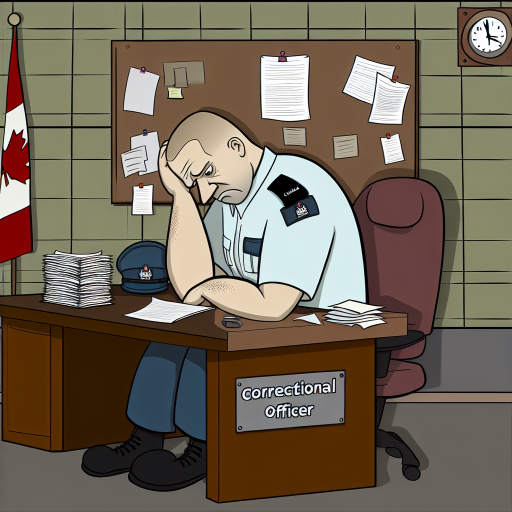Overview of Correctional Officer Roles in Canada
Introduction to Correctional Officers
Correctional officers play a crucial role in the Canadian criminal justice system.
They ensure the safety of inmates, staff, and the public.
These professionals maintain order within correctional facilities.
They also support rehabilitation efforts for offenders.
Responsibilities of Correctional Officers
Correctional officers conduct regular inspections of the facilities.
They monitor inmate behavior to prevent violence and conflicts.
Additionally, officers supervise inmate activities and programs.
They respond quickly to emergencies, ensuring safety at all times.
Record-keeping is another key responsibility of these officers.
Types of Correctional Facilities
Canada has various types of correctional facilities.
They include federal, provincial, and territorial institutions.
Each type serves different categories of offenders.
Federal institutions house inmates serving longer sentences.
Provincial facilities manage those with shorter sentences.
Skills Required for Correctional Officers
Strong communication skills are essential for correctional officers.
They must effectively interact with inmates and colleagues.
Conflict resolution skills help maintain a safe environment.
Additionally, they should possess strong observational skills.
Physical fitness is important for handling challenging situations.
Training and Education
Candidates must undergo a rigorous training program.
This training includes both classroom instruction and practical exercises.
Programs cover topics like security procedures and crisis management.
Additionally, training emphasizes ethical decision-making.
Successful completion leads to certification as a correctional officer.
Educational Qualifications Required for Correctional Officers
Minimum Required Education
Correctional officers in Canada typically need a secondary school diploma.
Unlock Your Career Potential
Visualize a clear path to success with our tailored Career Consulting service. Personalized insights in just 1-3 days.
Get StartedThis educational requirement ensures a foundational level of knowledge.
Some provinces may require post-secondary education for specific positions.
Preferred Higher Education
Many employers prefer candidates with a diploma or degree in criminology or a related field.
This preference helps in understanding complex legal and psychological aspects.
Programs in social sciences also boost a candidate’s profile.
Additional Training Programs
Correctional officers may benefit from specialized training programs.
Courses in conflict resolution and crisis management enhance practical skills.
First aid and CPR certification is also advantageous for potential candidates.
Continuous Professional Development
Correctional officers are encouraged to pursue ongoing education and training.
Participating in workshops and seminars keeps skills updated.
Moreover, attending conferences offers networking opportunities.
Volunteer Experience
Volunteer experience in community service can be valuable.
Such experience develops communication and interpersonal skills.
Many employers appreciate candidates with practical experience in the field.
Enhancing Career Opportunities
Meeting the educational qualifications enhances career opportunities.
Candidates with relevant education and training stand out in the application process.
Ultimately, a commitment to lifelong learning benefits correctional officers’ careers.
Mandatory Training Programs and Certifications
Initial Training Requirements
New correctional officers must complete an extensive training program.
This program covers a variety of essential topics.
Communication skills are a significant focus of the training.
Additionally, conflict resolution techniques are taught.
Officers learn how to manage hostile situations effectively.
Certification Process
Upon completing the initial training, officers must obtain specific certifications.
First aid and CPR certifications are crucial for all correctional staff.
Moreover, they must complete firearms training and certification.
This training ensures safety and preparedness in potential emergencies.
Ongoing Professional Development
Continuous education is vital for correctional officers.
They participate in workshops and seminars regularly.
Topics include mental health awareness and legal updates.
This ongoing training helps officers stay informed and effective.
Fitness and Wellness Programs
Physical fitness is emphasized in the training regimen.
Correctional officers engage in regular physical assessments.
Wellness programs also support mental health and resilience.
These initiatives promote overall well-being in a demanding job.
Specialized Training Options
Officers may pursue specialized training for advanced roles.
Some options include crisis negotiation and tactical response training.
Such training enhances their capabilities in high-pressure situations.
Specialized courses prepare officers for leadership positions.
Impact of Training on Career Advancement
Successful completion of training often leads to promotions.
Officers gain valuable skills that enhance their job performance.
Moreover, additional certifications can lead to diverse career paths.
Continuous training is a pivotal factor in professional growth.
Delve into the Subject: Understanding Confidentiality in Ombudsman Work
Physical Fitness Standards and Assessments
Introduction to Physical Fitness Standards
Physical fitness is crucial for Canadian correctional officers.
It ensures they can handle the demands of their duty.
The standards are designed to assess strength, endurance, and agility.
Fitness Assessment Components
The fitness assessment consists of several key components.
These components include aerobic capacity and muscular strength.
Moreover, flexibility and body composition also play essential roles.
Aerobic Capacity Evaluation
Aerobic capacity is fundamental for correctional officers.
This component typically involves a 20-meter shuttle run.
Officers must maintain a specific pace throughout the test.
It measures their endurance and ability to perform under stress.
Muscular Strength Testing
Muscular strength assessments often involve push-ups and sit-ups.
These exercises gauge upper and core body strength.
Officers must complete a minimum number of repetitions.
This requirement ensures they can physically control situations.
Flexibility Requirements
Flexibility is assessed using a sit-and-reach test.
This test measures the flexibility of lower back and hamstrings.
It is vital for preventing injuries while on duty.
Body Composition Standards
Body composition is another critical aspect of fitness assessments.
Officers must maintain a healthy body mass index (BMI).
This standard helps ensure overall physical readiness.
Implications of Fitness Assessments
These fitness assessments establish the readiness of correctional officers.
Passing the tests is mandatory for anyone aspiring to this career.
Ultimately, maintaining high physical fitness standards benefits public safety.
Explore Further: Workplace Culture in Canadian Correctional Facilities
Psychological Evaluations and Mental Health Training
Importance of Psychological Evaluations
Psychological evaluations are critical for correctional officers.
These assessments help identify mental fitness for the role.
Furthermore, they evaluate an individual’s coping mechanisms.
Effective evaluations contribute to workplace safety.
They also minimize the risk of mental health issues during employment.
Components of Psychological Evaluations
Several components make up the psychological evaluation process.
- Cognitive testing assesses reasoning and problem-solving skills.
- Personality assessments gauge emotional stability and interpersonal skills.
- Situational judgment tests evaluate decision-making in high-pressure scenarios.
- Interview techniques explore personal history and behavioral tendencies.
These assessments provide valuable insights into a candidate’s suitability.
Ongoing Mental Health Training
Ongoing mental health training is essential for correctional officers.
This training equips officers with strategies to manage stress.
Additionally, it fosters healthy coping mechanisms for challenging situations.
Topics Covered in Mental Health Training
Training sessions typically cover various important topics.
- Recognizing signs of mental health issues in colleagues and inmates.
- Effective communication techniques for de-escalating conflict.
- Stress management practices to support mental well-being.
- Resources available for mental health support and intervention.
Such training enhances the overall mental resilience of officers.
Collaborative Support Systems
Collaboration with mental health professionals strengthens training programs.
Experts provide valuable feedback on training effectiveness.
Furthermore, their involvement ensures that best practices are followed.
This partnership creates a comprehensive support system for officers.
Discover More: Importance of Veterans Affairs Officers for Veterans
Legal Knowledge and Understanding of Human Rights
Importance of Legal Knowledge
Correctional officers must possess a solid foundation in legal principles.
This knowledge ensures they uphold the law effectively.
Moreover, it helps in maintaining order and safety within correctional facilities.
Understanding Human Rights
Human rights awareness is crucial for correctional officers.
They interact with individuals who have rights that must be respected.
Understanding these rights helps prevent abuses and discrimination.
Training on Legal Standards
Officers undergo training about pertinent legal frameworks.
This training includes national and international laws.
Additionally, it covers relevant case law and legal precedents.
Application in Daily Duties
Correctional officers apply their legal knowledge in various scenarios.
For instance, they often encounter situations requiring conflict resolution.
Their understanding of human rights informs their decision-making processes.
Continuing Education
Continuous learning is important in the field of corrections.
Current legal trends and changes in legislation require regular updates.
Many facilities offer ongoing training programs to facilitate this process.
You Might Also Like: Day in the Life of a Correctional Officer in Canada

On-the-Job Training and Mentorship Opportunities
Role of On-the-Job Training
On-the-job training is crucial for correctional officers.
It provides hands-on experience in a real-world environment.
This training allows officers to apply their knowledge effectively.
Moreover, it helps them understand institutional procedures.
Daily tasks become clearer through direct involvement.
Structured Mentorship Programs
Structured mentorship programs are vital for professional growth.
New officers often feel overwhelmed in their roles.
Mentorship offers guidance through experienced colleagues.
Mentors help newcomers navigate complex situations.
This support builds confidence and competence over time.
Benefits of Mentorship
The benefits of mentorship extend beyond basic training.
New officers gain insights that classroom training may miss.
Furthermore, mentorship fosters a supportive work culture.
It encourages strong relationships among staff members.
Moreover, mentees often develop leadership skills through guidance.
Continuous Professional Development
Continuous professional development is essential in corrections.
Ongoing training keeps officers updated on best practices.
This emphasis on learning supports career advancement.
Additionally, it prepares them for unforeseen challenges.
For instance, crisis management training can save lives.
Partnerships with Educational Institutions
Partnerships with educational institutions enhance training programs.
Corrections facilities often collaborate with local colleges.
These collaborations lead to tailored training solutions.
As a result, officers receive education aligned with industry standards.
Such partnerships also facilitate research opportunities.
Continuing Education and Professional Development
Importance of Ongoing Training
Continuous training is vital for correctional officers in Canada.
This training ensures they remain knowledgeable and effective in their roles.
Furthermore, ongoing education enhances their skills in handling complex situations.
Required Courses and Specializations
Correctional officers must engage in various training courses throughout their careers.
Key areas of focus include conflict resolution, crisis intervention, and rehabilitation strategies.
Additionally, specializations such as mental health intervention are increasingly important.
These courses help officers understand and address the needs of diverse inmate populations.
Workshops and Seminars
Participating in workshops is another critical aspect of professional development.
These sessions provide hands-on experience and latest industry insights.
Topics may include security technology updates and legal changes affecting corrections.
Moreover, seminars allow officers to network with peers and share best practices.
Online Learning Opportunities
Online training platforms offer flexible learning options for correctional officers.
They can complete courses at their own pace while balancing work and personal commitments.
Moreover, online resources often include a variety of relevant topics and cases.
Certification and Accreditation
Obtaining certifications can enhance a correctional officer’s career prospects.
Accredited programs provide validation of skills and knowledge to employers.
This certification process often requires continuing education to maintain validity.
As a result, it motivates officers to stay updated and engaged in their profession.
Future Trends in Corrections Training
The landscape of corrections training is evolving rapidly.
Emphasis on mental health awareness and trauma-informed care is increasing.
Additionally, technological advancements are shaping training methodologies.
Officers must adapt to these trends to improve their effectiveness and adaptability.
Career Advancement and Specialization Options
Promotional Opportunities
Correctional officers have numerous opportunities for advancement.
With experience, they can move into supervisory roles.
Additional training can prepare officers for management positions.
Specialized roles often exist within correctional institutions.
These roles may include program coordinators and training officers.
Career progression often leads to higher pay and responsibilities.
Networking with colleagues can open up advancement opportunities.
Specialized Training Programs
Several specialized training programs are available for correctional officers.
Programs may focus on areas such as mental health and crisis intervention.
These trainings enhance skills to better serve inmate populations.
Officers can also pursue courses in conflict resolution and mediation.
Advanced training can help in navigating complex situations effectively.
Moreover, some institutions offer leadership development initiatives.
Certification and Continuing Education
Certification helps correctional officers demonstrate expertise in their field.
Organizations like the Canadian Association of Correctional Officers provide certifications.
Continuous learning is crucial for staying current with best practices.
Online courses and workshops make further education accessible.
Officers should seek certifications relevant to their career interests.
Participating in industry conferences can expand knowledge and networking.
Transitioning to Other Roles
Some correctional officers may choose to transition to law enforcement.
The skills gained in corrections are valuable in police work.
Other options include roles in rehabilitation or probation services.
Understanding the criminal justice system is advantageous in these areas.
Transitioning may require additional training or certifications.
Networking during the transition can greatly assist job placement.
Additional Resources
Correctional Officer Training Program | Government of Prince …
Qualification standards for the core public administration by …




